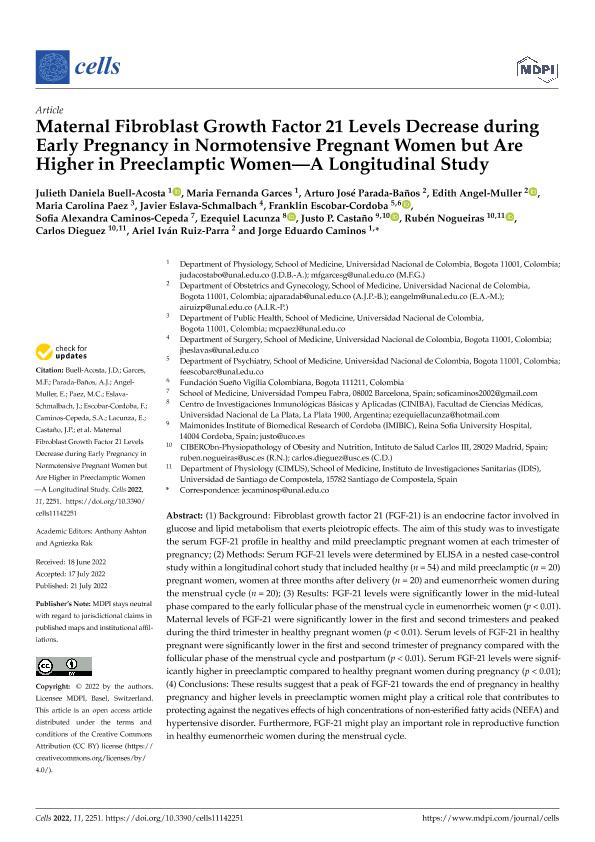Mostrar el registro sencillo del ítem
dc.contributor.author
Buell Acosta, Julieth Daniela
dc.contributor.author
Garces, Maria Fernanda
dc.contributor.author
Parada Baños, Arturo José
dc.contributor.author
Angel Muller, Edith
dc.contributor.author
Paez, Maria Carolina
dc.contributor.author
Eslava Schmalbach, Javier
dc.contributor.author
Escobar Cordoba, Franklin
dc.contributor.author
Caminos Cepeda, Sofia Alexandra
dc.contributor.author
Lacunza, Ezequiel

dc.contributor.author
Castaño, Justo P.
dc.contributor.author
Nogueiras, Rubén
dc.contributor.author
Dieguez, Carlos
dc.contributor.author
Ruiz Parra, Ariel Iván
dc.contributor.author
Caminos, Jorge Eduardo
dc.date.available
2023-11-07T13:03:21Z
dc.date.issued
2022-07
dc.identifier.citation
Buell Acosta, Julieth Daniela; Garces, Maria Fernanda; Parada Baños, Arturo José; Angel Muller, Edith; Paez, Maria Carolina; et al.; Maternal Fibroblast Growth Factor 21 Levels Decrease during Early Pregnancy in Normotensive Pregnant Women but Are Higher in Preeclamptic Women—A Longitudinal Study; MDPI; Cells; 11; 14; 7-2022; 1-15
dc.identifier.issn
2073-4409
dc.identifier.uri
http://hdl.handle.net/11336/217285
dc.description.abstract
Background: Fibroblast growth factor 21 (FGF-21) is an endocrine factor involved in glucose and lipid metabolism that exerts pleiotropic effects. The aim of this study was to investigate the serum FGF-21 profile in healthy and mild preeclamptic pregnant women at each trimester of pregnancy; (2) Methods: Serum FGF-21 levels were determined by ELISA in a nested case-control study within a longitudinal cohort study that included healthy (n = 54) and mild preeclamptic (n = 20) pregnant women, women at three months after delivery (n = 20) and eumenorrheic women during the menstrual cycle (n = 20); (3) Results: FGF-21 levels were significantly lower in the mid-luteal phase compared to the early follicular phase of the menstrual cycle in eumenorrheic women (p < 0.01). Maternal levels of FGF-21 were significantly lower in the first and second trimesters and peaked during the third trimester in healthy pregnant women (p < 0.01). Serum levels of FGF-21 in healthy pregnant were significantly lower in the first and second trimester of pregnancy compared with the follicular phase of the menstrual cycle and postpartum (p < 0.01). Serum FGF-21 levels were significantly higher in preeclamptic compared to healthy pregnant women during pregnancy (p < 0.01); (4) Conclusions: These results suggest that a peak of FGF-21 towards the end of pregnancy in healthy pregnancy and higher levels in preeclamptic women might play a critical role that contributes to protecting against the negatives effects of high concentrations of non-esterified fatty acids (NEFA) and hypertensive disorder. Furthermore, FGF-21 might play an important role in reproductive function in healthy eumenorrheic women during the menstrual cycle.
dc.format
application/pdf
dc.language.iso
eng
dc.publisher
MDPI

dc.rights
info:eu-repo/semantics/openAccess
dc.rights.uri
https://creativecommons.org/licenses/by/2.5/ar/
dc.rights.uri
https://creativecommons.org/licenses/by/2.5/ar/
dc.subject
FGF-21
dc.subject
MENSTRUAL CYCLE
dc.subject
PREECLAMPSIA
dc.subject
PREGNANCY
dc.subject.classification
Bioquímica y Biología Molecular

dc.subject.classification
Ciencias Biológicas

dc.subject.classification
CIENCIAS NATURALES Y EXACTAS

dc.title
Maternal Fibroblast Growth Factor 21 Levels Decrease during Early Pregnancy in Normotensive Pregnant Women but Are Higher in Preeclamptic Women—A Longitudinal Study
dc.type
info:eu-repo/semantics/article
dc.type
info:ar-repo/semantics/artículo
dc.type
info:eu-repo/semantics/publishedVersion
dc.date.updated
2023-11-06T15:31:07Z
dc.identifier.eissn
2073-4409
dc.journal.volume
11
dc.journal.number
14
dc.journal.pagination
1-15
dc.journal.pais
Países Bajos

dc.description.fil
Fil: Buell Acosta, Julieth Daniela. Universidad Nacional de Colombia; Colombia
dc.description.fil
Fil: Garces, Maria Fernanda. Universidad Nacional de Colombia; Colombia
dc.description.fil
Fil: Parada Baños, Arturo José. Universidad Nacional de Colombia; Colombia
dc.description.fil
Fil: Angel Muller, Edith. Universidad Nacional de Colombia; Colombia
dc.description.fil
Fil: Paez, Maria Carolina. Universidad Nacional de Colombia; Colombia
dc.description.fil
Fil: Eslava Schmalbach, Javier. Universidad Nacional de Colombia; Colombia
dc.description.fil
Fil: Escobar Cordoba, Franklin. Universidad Nacional de Colombia; Colombia
dc.description.fil
Fil: Caminos Cepeda, Sofia Alexandra. Universitat Pompeu Fabra; España
dc.description.fil
Fil: Lacunza, Ezequiel. Universidad Nacional de La Plata. Facultad de Ciencias Médicas; Argentina. Consejo Nacional de Investigaciones Científicas y Técnicas. Centro Científico Tecnológico Conicet - La Plata; Argentina
dc.description.fil
Fil: Castaño, Justo P.. Universidad Nacional de Colombia; Colombia
dc.description.fil
Fil: Nogueiras, Rubén. Instituto de Salud Carlos III; España
dc.description.fil
Fil: Dieguez, Carlos. Instituto de Salud Carlos III; España
dc.description.fil
Fil: Ruiz Parra, Ariel Iván. Universidad Nacional de Colombia; Colombia
dc.description.fil
Fil: Caminos, Jorge Eduardo. Universidad Nacional de Colombia; Colombia
dc.journal.title
Cells

dc.relation.alternativeid
info:eu-repo/semantics/altIdentifier/doi/http://dx.doi.org/10.3390/cells11142251
Archivos asociados
